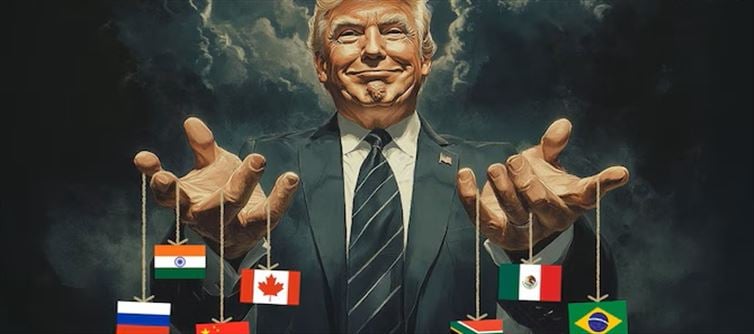
Trump has been loud about slapping 10% tariffs on goods from China, 25% on nearby mexico and canada, and the european union (EU). He has also threatened to levy a 100% tax on india and the other BRICS countries.
Curiously, the 78-year-old has yet to carry out his tariff plans, despite his pledge to do so as soon as he took office. Even though trump previously stated that his administration intended to implement the tariffs on february 1st, the postponement has many analysts wondering if he would risk causing a major global upheaval by imposing trade taxes on key countries.
REALITY OR BLUFF?
According to international analysts and economists, trump is in "wait and watch mode" and may pursue a more transactional strategy, looking for advantageous agreements on immigration and other fronts.
Borge Brende, president of the World Economic Forum, for example, told india Today exclusively that donald trump is a dealmaker, raising the possibility that the US president is employing tariffs as a tactic to obtain leverage.
Brende stated, "The united states occasionally imposes tariffs to observe the outcome in the future."
Peter Navarro, the White House's trade advisor, recently told CNBC that Trump's threat of tariffs on canada and mexico was intended only to put pressure on the two nations to prevent the entry of illegal immigrants and narcotics into the United States.
Furthermore, it appears that trump prefers to negotiate better terms than enact real tariffs, as seen by his current tariff threat against the EU.
According to trump, "the european union is very, very bad to us," They will thus be subject to tariffs. It's the only way to ensure fairness," he continued.
TRUMP'S PREDICTABILITY
However, because of his extremely unpredictable nature, economists have likewise refrained from explicitly stating that donald trump is bluffing.
The issue is still uncertain and crucial for the global economy since donald trump really thinks that imposing tariffs on other nations would benefit the US economy.
"President Trump's statements have been creating tremors across the globe and leading to uncertainty concerning trade across the globe," stated kranthi Bathini, director of Equity Strategy, at WealthMills Securities.
According to Bathini, Donald Trump's remarks, such as the one in which he called tariffs the "most beautiful word in the dictionary," have heightened concerns in international markets.
IMPACT OF TRADE TARIFFS
Experts have previously cautioned that the proposed tariffs may degenerate into a full-scale trade war, which would be detrimental to all countries.
With the world economy slowing down, the impacts of the trade war between the US and China, which caused significant disruptions during his first term, will undoubtedly be more noticeable this time.
High inflation, losses on international financial markets, and potential recessions in a number of nations are all potential consequences of a trade war. And for that reason, the trump administration may be considering its alternatives before imposing any specific tariffs.
IS india AT RISK FROM trump TARIFFS?
India is not immediately in danger if donald trump decides to move forward with his tariff action, according to several international analysts.
Additionally, kranthi Bathini raised a crucial argument. He pointed out that bilateral agreements between two nations constitute commerce, and both sides want the best possible bargain.
"The US has larger bilateral trade with countries like China, Brazil, and canada, and President trump is making intentional statements that are happening in favor of these countries," Bathini stated.
He stated, "With regard to india, our bilateral trade is limited at this point in time in terms of the exchange of goods," suggesting that tariffs would have little effect on India.




 click and follow Indiaherald WhatsApp channel
click and follow Indiaherald WhatsApp channel